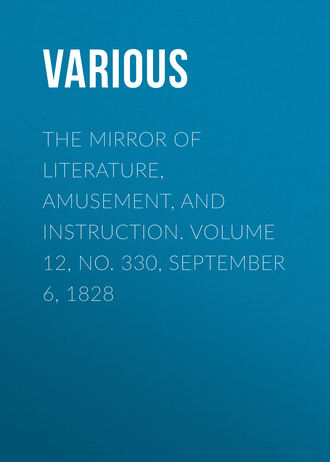 полная версия
полная версияThe Mirror of Literature, Amusement, and Instruction. Volume 12, No. 330, September 6, 1828

Various
The Mirror of Literature, Amusement, and Instruction / Volume 12, No. 330, September 6, 1828
WHY ARE NOT THE ENGLISH A MUSICAL PEOPLE?
We cannot help it.—Massinger's Roman Actor.
Astronomy, music, and architecture, are the floating topics of the day; on the second of these heads we have thrown together a few hints, which may, probably prove entertaining to our readers.
The English are not—you know, reflective public—a musical people; this has been said over and over again in the musical and dramatic critiques of the newspapers. True it is that we have no national music, like our neighbours the Welsh, the Irish, or the Scotch; for our music, like out language, is a mere riccifamento, stolen from every nation in Europe. But our king (God bless him) is an excellent musician, and plays the violoncello most delightfully; and we have an Academy of Music. Then we have an Italian Theatre that burns the feet and fingers of all who meddle with its management—witness, Mr. Ebers, who, by being "married" to sweet sounds, lost the enormous sum of 47,000l.—it must be owned, an unfortunate match, or as Dr. Franklin would have said, "paying rather too dear for his whistle." We have too an English Opera House, where scarcely any but foreign music is heard, and which, to the ever-lasting credit of its management, has transplanted from the warm climes of the south to our ungenial atmosphere, some of the finest compositions in the continental schools of modern music. Success has, however, attended most of their enterprises; for the taste of the English for foreign music is by no means a modern mania. From Pepys's Diary we learn that the first company of Italian singers came here in the reign of Charles II.: they were brought by Killigrew from Venice, about 1688; but they did not perform whole operas, only detached scenes in recitative, and not in any public theatre, but in the houses of the nobility. Thus, Italian music was loved and cultivated very early in England, and London was the next capital, after Vienna, which established and supported an Italian Opera. But, as we never do things by halves, we had soon afterwards, two opposition houses. This proves that the English have a taste for music; indeed they have much more judgment than some of their neighbours, which makes it still more to be regretted that nothing is done in England towards the advancement of music as a science. Is the world of sound and the soul of song exhausted? Why should we, who are marching in every other direction, stand still in this? But no; what Orpheus did with music, we are striving to accomplish by steam; what he effected by quietly touching his lyre, we study with the atmospheres and condensers of high and low pressure engines.
The writer of a delightful paper in the Foreign Review, No. 3, in tracing the rise and progress of music, inquires what has become of "its loftier pretensions, its celestial attributes, its moral and political influence." He then facetiously observes, "How should we marvel to see the Duke of Wellington, like another Epaminondas, take his flute out of his pocket to still the clamour of the opposition, or Mr. Peel reply to the arguments of Mr. Huskisson with an allegro on the fiddle."
The Greeks were not such grave people as some may be inclined to think them. Among them, poetry and music were so intimately connected, that they were in fact one and the same. It is not so with us; we have Byron and Moore, in poetry; but where are their parallels in English music!
"Music," says Plutarch, "was the universal language of Greece, the sacred vehicle of history, philosophy, laws, and morals;" but in England it is little more than a mere amusement to while away the evening, or at best, but a branch of female education. Pianos are become articles of furniture to be met with in almost every other genteel house; Miss and her sisters sit down by turns, and screw themselves up to Ah vous dirai, or "I'd be a butterfly"—till some handsome young fellow who has stood behind her chair for six months, turned over her music, or accompanied her through a few liquorish airs, vows his tender passion, brings her the last new song, and at length swears to be her accompaniment throughout life. The piano is then locked up, the music sent to Bath or Canterbury, and the lady is married and cannot sing.
But the Greek poets sang their own verses: "Homer literally sang the wrath of Achilles, and the woes of Greece;" would it were so in England. Then, my poetical public, we should have Anacreon Moore singing his "Rich and rare were the gems she wore," in some such place as the Quadrant, or Opera Colonnade; and Sir Walter Scott celebrating the Field of Waterloo, not in the broad-margined octavos of Paternoster-row, but about the purlieus of the Horse Guards. Wordsworth would be his own Skylark. The laureate, Southey, would perch himself on the dome of the New Palace. Campbell would step out of New Burlingtonstreet into the Park; Miss Mitford would keep a Covent-Garden audience awake with her own tragedies, and Planché would no longer entrust his rhymes to Paton or Vestris. On the other hand, Braham would no longer be indebted to Moore for his songs, Bishop would write, compose, and sing his own operas, and all our vocalists enter, like Dryden's king and two fiddlers, solus!
Could we but once become a musical people, we should no longer marvel at the effect of music in ancient times; for who knows but that if an Englishman were to play like Orpheus, the River Thames might cease to flow; the disposal of Mr. Cross's menagerie be no longer a question, since the animals might be allowed to ramble about the Strand; and Snowdon or Cader Idris journey to the King's Theatre to listen to his inspirations.
It is, however, impossible to calculate the benefits which this acquisition of musical skill might prove to the English people. What bloodshed and tribulation it would prevent. Weare, or Maria Marten, like Stradella, might have disarmed their assassins; the Insolvent Act would be obsolete, and duns defeated; since hundreds of improvident wights, like Palma, might, by their strains, soften the hearts of their creditors, and draw tears from sheriff's officers. Chancery-lane would be depopulated, and Cursitor-street be left to the fowls of the air; locks would fall 50 per cent, and Mr. Bramah might betake himself to Van Dieman's Land. What a pleasant thing would a public dinner be; for, instead of a gentleman in a dress coat singing as from the orchestra of an oratorio, he would throw a more impassioned energy into his own compositions than he could possibly impart to those of another, and proportionally enhance the delight of his company. All the mechanism of professional singing would then give way to "the feast of reason and the flow of soul."
We know not how to have done with these pleasures of "linked sweetness"—this "mosaic of the air," as Marvell quaintly calls it. We have a decided aversion to the system of borrowing, which, in the absence of our own musical resources, seems to be universally adopted. Thus, as Charles Mathews says, "every footman whistles Frieschutz;" and the barrel organ which does not play two or three of its airs may be consigned to the brokers. A few months since every bachelor hummed or whistled "C'est l'amour," and the French, to return the compliment, have made our "Robin Adair," one of the claptraps of the music of their La Dame Blanche. Next, when will Mr. Bishop's Home, sweet home, be forgotten, although the original is a Sicilian air of considerable antiquity. All the baker's and butcher's boys in London can go through "Di tanti pal"—where they leave off, answer a question, and take up the "piti," with the skill of a musician; and as readily fall into the sympathetic melodies of "Oh no we never mention her," or the "Light Guitar." But to atone for these vulgarisms, who that has heard the syren strains of Stephens or Paton, or the Anglo-Italian style of Braham, but has envied them the pleasurable monopoly of delighting thousands, and sending them home with the favourite air still echoing in their ears, and lulling them to soft slumbers! Who is there that has enjoyed his circle of friends without regretting a thousand times that he had not a fiftieth part of such talent to enliven the festive hour, and lend a charm, however, fleeting, to what may be termed the poetry of life.
As we have noticed the taste of the Greeks for music, it is but fair that we should allude to that of their successors. In ancient Rome, music was never popular. Combats of gladiators and wild beasts filled their theatres with streams of blood, instead of their resounding with music; and after the death of Nero,1 that beautiful art was declared infamous, and by a public decree, banished from the city. In our theatres, however, heroes fight to music, from the Richard III. and Richmond of Shakspeare to the "terrific combats" of modern melodrame.
Anything is, however, better than despair, and let us hope that something may be done towards the amendment of our musical reputation. We have too much of what Cobbett would call the "dead-weight" in us to become adopted by Apollo as the "children of song;" but what with the school of music in Tenterden-street, and numberless juvenile prodigies, we may indulge the expectation of rising in the diatonic scale, and that too at no very distant period. Burney and Crotch were remarkable instances of precocious musical skill; and in the present day, children from eight to twelve sing the most popular Italian airs on the English stage, with remarkable accuracy.
Apropos, we hear of constitutions being set to music, for says the Foreign Review, "during the short revolution at Naples, in 1820, a Neapolitan was heard to swear that if the government intended that the new constitution should be understood or accepted by the people, they must first have it set to music by Rossini."
GARDENS OF THE ZOOLOGICAL SOCIETY, REGENT'S PARK
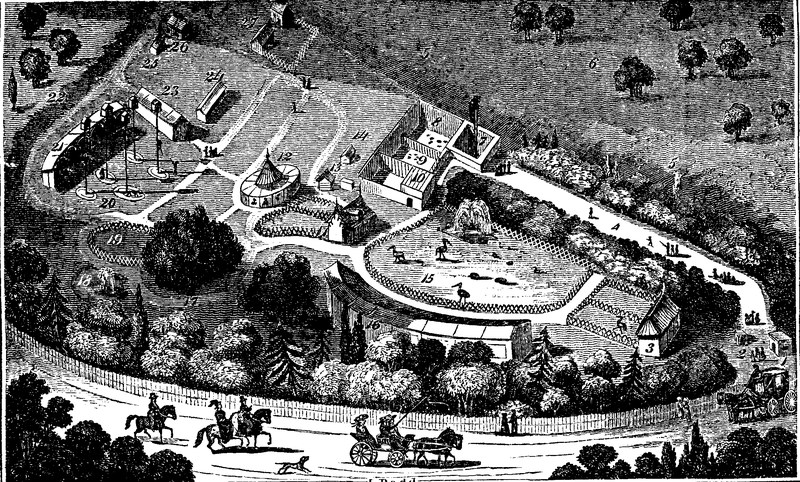
We are again in the Regents Park; but we must leave its architectural splendour for the present, and request our readers to accompany us towards the eastern verge of the Park, to the Gardens of the Zoological Society, established in 1826, and whose members now amount to eleven hundred! The grounds are daily filled with fashionable company, notwithstanding the great migrations which usually take place at this season of the year, and almost depopulate the western hemisphere of fashion. The gardens, independent of their zoological attractions, are a delightful promenade, being laid out with great taste, and the parterres boasting a beautiful display of flowers. The animals, too, are seen to much greater advantage than when shut up in a menagerie, and have the luxury of fresh air, instead of unwholesome respiration in a room or caravan.2
At page 413 of our last volume, the reader will find an abstract of the second anniversary of the Society, since which the Gardens in the Regent's Park have been opened for public inspection. We have accordingly availed ourselves of this privilege, and our draughtsman has been at some pains in the annexed sketch, together with the vignette portraits accompanying it. The "Bird's-Eye View" will be better explained by reference to the figures; thus,
1. Entrance Gate and Pay Hut.
2. Ditto Check Hut.
3. House and Ground for Emus:
Two awkward land birds, resembling ostriches. Their incapability of flying is compensated by the exceeding speed with which they run. They are natives of New Holland.
4. Central Walk.
5. Sloping Shrubbery of Defence.
6. Fields for Horses and Cattle.
7. Building for Bears,,
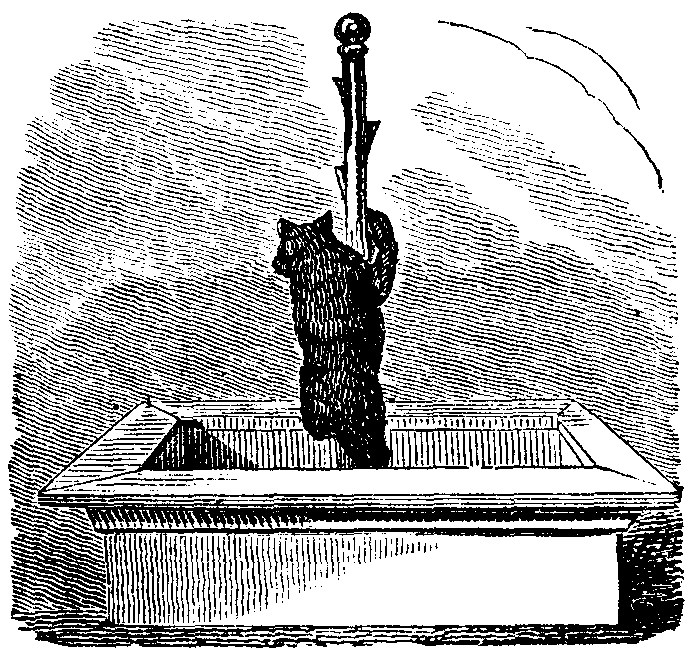
communicating with their pit, in the centre of which is a pole with steps for the animals to ascend and descend. At the extremity of the upper walk, the pit is surrounded with a dwarf wall and coping, to which (since our sketch was taken) have been added iron rails. There are here two Arctic bears, and a small black bear, the latter brought from Russia,3 and presented to the Society, by the Marquess of Hertford. There is usually a crowd of visiters about this spot, and the sagacity and antics of our four-footed friends ensure them liberal supplies of cakes and fruit, handed to them on a pole. We were much interested with their tricks, especially with the vexation betrayed by one of them, at the top of the pole, when he saw his companion below seize a cake which the former had previously eyed with great gout. His wringing and biting his paws reminded us of many scenes out of a bear-pit. Then the snorting and snarling of the old bear below, when the young one attempted to obtain a cake thrown to him; and above all, the small share which our black friend Toby enjoyed, probably from his docility over-much,—like good-natured men who are mastered by those of rough natures. We could have staid here a whole hour, watching their antics, and likening them to the little trickery of human nature.
8 and 9. Ground enclosed for Kangaroos,
of which there is a little herd, large and small. They are natives of New Holland. The fore legs are seldom more than twenty inches in length, whilst the hinder ones are sometimes three feet and a half long. They rest on the whole length of the hind feet, supporting themselves by the base of the tail, which, in truth, acts as a fifth leg, and is sometimes used as a weapon, being of such strength as to break a man's leg at a single blow. They move by leaps, which have been known to exceed twenty feet. Several kangaroos have been kept in the park at Richmond, and where they have produced young ones.
10. Dens
containing two fine leopards, a porcupine, and racoons. In an adjoining den are three wolves.
11. Gothic House for Lamas.
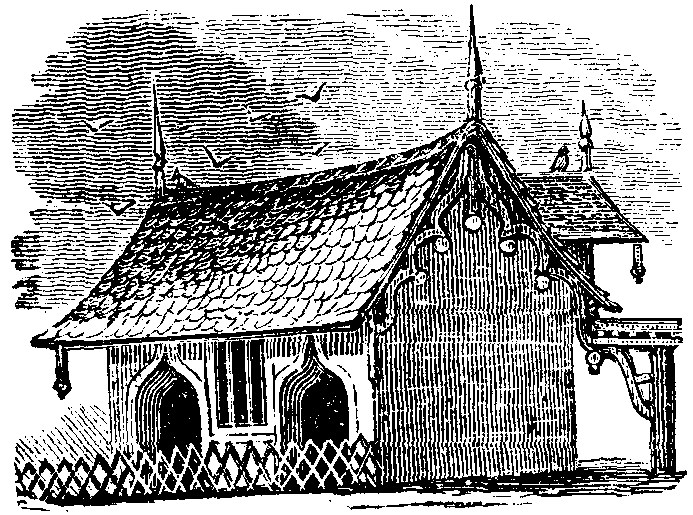
This is one of the most picturesque objects in the grounds. It contains two lamas. These animals are common in South America, particularly in the mountainous parts of Peru, where they are employed as beasts of burthen. One of the lamas was presented to the Society by the Duke of Bedford.
12. Circular Aviary for Birds of Prey
containing a fine griffon vulture, a white-headed North American eagle, hawks, falcons, and owls; among the latter is the great horned owl. This is supposed by Linnaeus, and many antiquaries, to have been the bird of Minerva. The collection is remarkably splendid.
13. Hut for Beavers.
14. Hut for Foreign Goats.
15. Enclosed Area and Fountain for Aquatic Birds, as pelicans, Solan geese, China geese, black swans, &c.
16. Aviary.
Here are three handsome crested cranes, four Indian spoonbills, together with three storks, three or four cockatoos, whose brilliant plumage outvies the gayest robe of art, and three curassos.
17. Grove and Huts for Esquimaux Dogs
of which there are three fine specimens.
18. Fountain, &c. for Water Fowl.
19. Enclosure for Zebras, Indian Cows, &c.
20. Houses on poles for Monkeys.
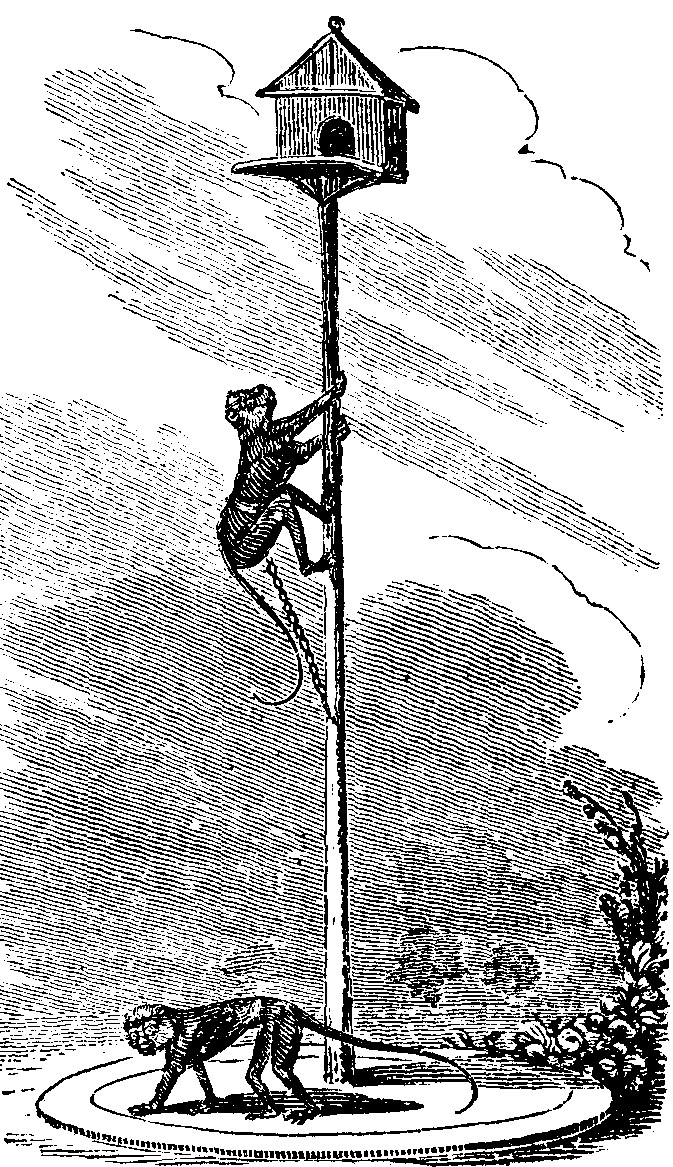
These are distributed beside the walks. The monkey is attached by a chain to a ring loosely round the pole, by which means he ascends and descends at pleasure.
21. Intended Aviary, (supposed for Eagles, Vultures, &c.).
22. Twenty acres about to be added.
23. House for Monkeys, &c.
Here are double rows of cages, containing a fine South American ocelot, a lynx, a puma, coatamondis, an ichneumon, and several monkeys; the last affording an excellent opportunity of appreciating the fidelity of Mr. Landseer's Monkeyana, and illustrating the vraisemblance of men and monkeys.
24. Intended Aviary.
25. Mexican Hogs, &c.
26. Huts for Jackalls, &c.
27. Unfinished Houses.
The carriage-road is formed of the outer side of the Park.
There is likewise an enclosure for Tortoises, of which there are three large and several small ones. We saw one of them devouring pumpkin as a gourmand would turtle, and this voracity is by weather-wise people considered as a sure indication of rain. This turtle is believed to be very old; he is of stupendous size, but buried as he was (except his neck) with shell, he soon became aware of the approach of his companion, nearly as large, and accordingly ate with increased greediness. Among the birds, too, should be mentioned several beautiful varieties of pheasants, partridges, &c. which are well worth the attention of the visiter.
We have probably passed over many animals, our object being merely to mention a few of the most interesting for their habits and peculiarities. Of course the collection is as yet incomplete, there being neither lion, tiger, hyaena, elephant, nor rhinoceros; but when it is considered that the Society has been established little more than two years, in which time a Museum has been formed, and 1,100 subscribers obtained, besides the arrangement of the Gardens—it will be acknowledged that much has been done in a short time, and judging from the excellent organization of the Society and their past success, we anticipate the utmost realization of their plan.
Our readers need not be told that the Zoological Society is partly on the plan of the Museum of Natural History at Paris, except that the latter is supported by the Government, the Gardens are indiscriminately opened to the public, free of cost, and the Museum on stated days; and when we add that the names of Fagon, Duverney, Tournefort, Vaillant, De Jussieu, Buffon, Daubenton, Fourcroy, Desfontaines, De Lamarck, and Cuvier, occur in its list of professors, they will not be surprised at the Musée d'Histoire Naturelle being the richest of its kind in the world.
As acceptable information, we subjoin the regulations for the admission of members and visiters to the Gardens in the Regent's Park, and the Museum, in Bruton-street; to the latter we shall allude at an early opportunity:—
Every member shall have personal admission to the gardens and museum, with two companions. If accompanied by more than two, he shall pay one shilling for each extra person.
A member, on payment of one guinea annually, may obtain an ivory ticket, which will admit one named person with a companion to both establishments; or a transferable ivory ticket which will admit one person. He may obtain two or more such tickets at the same rate.
Any member who may find it inconvenient to attend personally at the gardens or museum, may, upon application to the council, have his privileges transferred, within the present year, to any individual of his family, whom he may name.
Every member will be expected to give his name on entering the gardens and museum.
The gardens will be open to members from eight o'clock, A.M.; but they will be in complete readiness for the reception of visiters only from ten o'clock to sunset. The museum will be open from ten o'clock to six.
HERSCHEL'S TELESCOPE
(To the Editor of the Mirror.)Your article on the "Patrons of Astronomy," in the Mirror, No. 328, brought to my recollection the following anecdote, for the truth of which I can answer, having received it from Mr. Watson, well known as the most celebrated private optical instrument maker in Europe, and at the time living on intimate terms with the late Mr. Arnold, the most eminent watchmaker of the day. When the late Sir William Herschel's great telescope was first exhibited at Slough, among other scientific men who went to see it was Mr. Arnold, who took Mr. W. with him. Neither of them thought much of it, though it was praised by the multitude; as it was, with its constructor, patronized by the late king and his consort, for Herschel was a German, as you well know. A few astronomical amateurs, who thought as Mr. Arnold did, proposed to Mr. Adams, of Fleet-street, then astronomical instrument maker to the king, (by whom Mr. Watson was employed,) to get Watson to make an instrument in opposition to Herschel's. The order being given by Adams, Watson set about the work, and had made some progress in the construction of the instrument, when the circumstance found its way to the ears of royalty. Orders were immediately sent to Mr. Adams to put a stop to the work, or he should no longer be optician to the king. Watson did not proceed, but could never learn the cause of the counter-order, till after a lapse of several years, when a stranger called on him, in Valentine-place, Blackfriars-road, and after putting several questions to him about his instruments, related to him the cause of the counter-order; upon which Mr. Watson showed him the progress he had made, and which I have also seen. This story I heard related by Mr. Watson at a dinner party at Mr. Arnold's, at Well Hall, near Eltham, where were also Mr. Dollonds, and Mr. J. R. Arnold, the son.
A Constant Reader.
August, 24, 1828.
Our Correspondent will perceive that we have qualified some phrases of his letter, but that all the facts appear.
The Quarterly Review, No. 75, from which our notice was taken, is tolerably plain upon the lack of patronage towards astronomy in this country, and seems disposed, in enumerating the state of astronomical knowledge in civilized Europe, to place Great Britain beside Spain or Turkey!4 We chance to know that one of the most able and enterprising astronomers of the present day relinquished a lucrative profession, that he might be more at leisure to indulge his philosophical pursuits; so that, if patrons be wanting, this apathy does not appear to have entirely destroyed the taste for the divine study. This gentleman, in concert with another, ascertained, in the course of three years, the position and apparent distances of 380 double and triple stars, the result of about 10,000 individual measurements, and for their Memoir, they received the astronomical prize of the French Academy of Sciences. In the following year, the former individual communicated to the Royal Society the apparent distances and positions of 458 double stars, of which 160 had never before been observed.
Of course, our correspondent does not impeach the talent of HERSCHEL; but it is lamentable to reflect that no attempt has been made to repeat or extend the labours of that indefatigable astronomer.—ED.
THE KELPIE
A SCOTTISH LEGEND
(For the Mirror.)"Kelpie's a river demon or a god,"Thus say the lexicons; I'll not belie 'em,For though I mind not in the least the nodOf these same critics, still I'll not defy 'em;But that you may know more of this same god,(Though I can't sing as Homer sung of Priam,)I'll write a very pretty little poem,Of which this present stanza's but the proem.But to begin, for though 'tis rather long,My poem I'll comprise into twelve stanzas,Or fourteen at the furthest, if my songDon't run to twenty—I'll offend no man, sirs,If I can help it. So now I'm alongThe road, and beg you'll notice these two lancers,Who, on the backs of horses full of mettleHold a dispute, which we'll leave them to settle,While you go with me, reader, kind and good,To a small tributary stream from Tweed,Which, if you don't know, as I'm in the mood,I'll do my best to teach you, if you'll read;I'll introduce you to the stream Glenrude—This name will do—'twas in a glen—indeed,'Twas not its proper name—'twill do quite well,Why I choose so to call it I shan't tell,But still it was a very pretty river,Or rather stream, as ever could be seen—If not so wide as the great Guadalquiver,Its banks were nearly always clothed in green,(Save when in winter the winds made you shiver,)While the waves, bickering so bright and sheen,Put you in mind of Avon, Rhine, or Hellespont,Or any other stream to admire you're wont.And round about the stream there were huge hillocks,And firs and mountains, houses too and farms;A maid lay on the grass—her light and fair locksWere gently wound around her folded arms,While softly grazing near there stood a huge ox,And o'er her head an old oak threw its arms.She was asleep, when, lo! the sound of horses'Feet woke her, and, behold, she saw two corses.At least she thought so—but at last thought better'Twould be for her to get up and go home;She got up quickly, and would soon have made herWay home, but that the men who had just comeSpurr'd past her, and alighted when they met her,While she with her surprise was almost dumb;But soon spoke she, and bade them both discloseTheir names—to which one said, "I'm Richard Groze."The next spoke not at first, but soon replied,"Pray wherefore are you so surprised, my dear?And wherefore, likewise, have you not compliedWith my request, which I have sent in nearSome good score letters? which you did deride,When they were forwarded by this man here."He pointed then to Groze, and then he sighed,"My dear, dear Jeannie, will you be my bride?"The which words when our Jeannie heard, she stared,And said, "What do you mean, John Fitzadree?You talk of letters, but of them the lairdHas never brought a single one to me;But when I've seen him I have never caredHow soon he went, for he told me that yeWere either dead or faithless—so he saidI'd better wed the live, than mourn the dead."And then he promis'd I should have six horses,Besides a coach, if I would be his bride;But I refus'd—and he swore all his crossesShould soon be o'er, and something else besideAnd that's the reason why I thought ye corses,When o'er the green this way I saw ye ride.But now I see you've both served in the Lancers,Though on my word you look much more like dancers."To which John answer'd, "Oh, the filthy fellow,I gave him letters to you, which he saidHe would deliver, were you ill or well. Oh!How I should like to knock him on the head,And would, but that would show I was quite mellow—Besides, I see the coward has just fled,Has ta'en to horse, and got across the ford—Hang him, that I should with him be so bored!"But Jeannie said, "John, thou shall do no murder."To which he answer'd, "I will not do so;"Then bounded off as though he had not heard her,And reached a fording-place, but not so lowAs where Groze cross'd, and who had now got furtherThan John would have thought possible, althoughHe'd a good-horse, and nearly half an hourIn start—but now the clouds began to lower.Now Fitzadree's good charger was all mettle,And soon won to the middle of the stream—But then the sky grew black as a tea kettle;It rained, too, quite as fast as ever steamRose. But the thing which did at last unsettleThe balance of John's steed, was what you'll deemA being that was nearly supernatural—But here the waves John's clothes began to spatter all.A form rose up from out the waves' abyss—A monstrous little man with a black hide,Scarce four feet high, yet he was not remiss,But dash'd the waves about—and then he cried,With a demoniac laugh, or rather hiss,"Die, mortal, die!" and John sank down and died,The which, when Jeannie saw, she only sigh'd,"I come, my John, I come, to be thy bride."The figure was the Kelpie—that she knew,And madly she rush'd on towards the shore;The Kelpie roar'd, "Come, mortal, come thou too."Ere he'd done speaking, Jeannie was no more;She'd dash'd into the waves, and left no clue,More than a steamer leaves just left the Nore,By which you might discover where she lay,And drag her upwards to the realms of day.But what befel the cause of all these woes?That's what I never heard, so cannot tell;But this I know, that this same Richard GrozeReturn'd no more to bonnie Scotland. Well,I only hope he may in bed repose,And that he may at last escape from hell.And this I know, that if you do not smotherThis poem, when I choose I'll write another.J.S.








